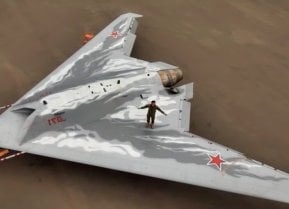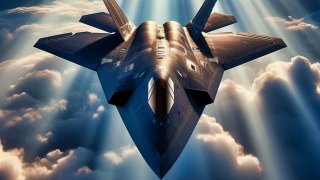SR-91: The Mach 5 Air Force Plane That May or May Not Be Real
Hypothetically, if it ever existed, which no one knows, the SR-91 Aurora could reach Mach 5+, making it the fastest manned aircraft ever to fly.
Hypothetically, if it ever existed, which no one knows, the SR-91 Aurora could reach Mach 5+, making it the fastest manned aircraft ever to fly.
However, it is a matter of speculation as to whether or not the SR-91 Aurora has ever even actually existed (the plane, that is; the American city of Aurora, Colorado certain does exist, and I imagine it’s upstanding and hard-working residents would not particularly care to be rendered “unpersons” a la George Orwell’s 1984).
To make matters a tad bit more confusing to the casual researcher, there is an airplane with the Aurora moniker whose existence is a known commodity, that being the Lockheed CP-140 Aurora, a maritime patrol craft used by the Canadian Forces for activities such as antisubmarine warfare (ASW), but definitely not the science fiction-worthy capabilities of the (most likely apocryphal) spy plane.
SR-91 – A Real-Life “X-File?”
The rumor intelligence (RUMINT) about the SR-91 Aurora kicked off in March 1990, when Aviation Week and Space Technology first broke the news that the term “Aurora” was inadvertently released in the 1985 US budget as an allocation of $455 Million for “black aircraft production” (as opposed to R&D) in FY 1987.
The initial rumors quickly gained more ground (or more altitude, if you prefer) after observers in Nevada claimed to have seen and heard a distinctive aircraft flying over the Mojave Desert at high altitude and speed, usually in the early morning; these eyewitnesses described the contrail as “doughnuts on a rope” and claimed the engine note at take-off “sounds like the sky ripping.”
Furthermore, alleged sightings of the Aurora soon made their way “across the pond” to Britain, beginning in late August 1989 with Chris Gibson, a 12-year veteran of the Royal Observer Corps and an expert on aircraft recognition; Mr. Gibson saw a triangular plane—unlike anything he had ever seen—flanked by two US fighters being refueled in flight by a tanker while he was working on the Galveston Key oil rig in 1989.
“There was no precedent for this,” he said. “I kind of sussed out that it was something I shouldn’t have seen.” In the spirit of the “special relationship” between the UK and the US, Her Majesty’s Government officially downplayed the stories such as Mr. Gibson’s, but there is evidence that behind the scenes, the UK Ministry of Defence (MoD) took the rumors much more seriously. Fast-forwarding to May 2006, the MoD published a report referring to U.S. Air Force priority plans to produce a supersonic vehicle that could reach speeds of Mach 4 to 6, which in turn fueled speculation that may have been another reference to the SR-91.
SR-91: All Just Rumors?
So then, assuming for argument’s sake that the Aurora actually does exist—or at least did at one time—why do we know so little about it, i.e. how is it that the U.S. Government is able to keep a much tighter lid on it than was the case with the original Stealth fighter and bomber, the F-117 Nighthawk and B-2 Spirit respectively?
Part of the possible explanation comes from my colleague Peter Suciu, who notes that “if the Aurora project ever existed, it was likely canceled due to the shift from spy planes to unmanned aerial vehicles (UAVs) and reconnaissance satellites, which can do the same job but with risk to a human operator.”
Moreover, Aurora would fall under as a Special Access Program (SAP), i.e. a “black program” that isn’t generally for public knowledge, and with severe penalties for anybody who would dare to compromise such sensitive information.
In the meantime, all we can do is continue to speculate, and, in the spirit of The X Files, channel FBI Special Agent Fox Mulder (David Duchovny) and declare, “The truth is out there, Scully.”
About the Author
Christian D. Orr is a former Air Force officer, Federal law enforcement officer, and private military contractor (with assignments worked in Iraq, the United Arab Emirates, Kosovo, Japan, Germany, and the Pentagon).


